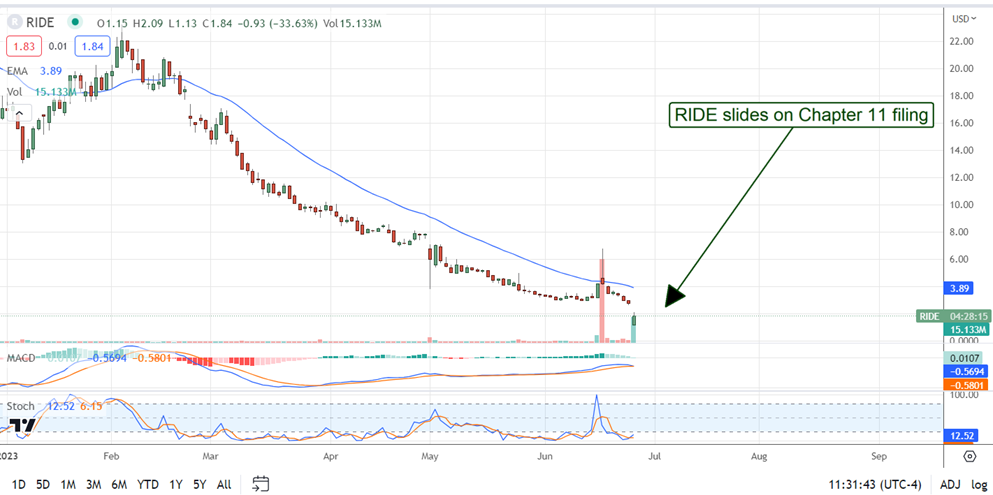- Lordstown Motors files for Chapter 11, citing a deal in bad faith with Foxconn.
- The stock is down more than 30% and has not hit bottom.
- A sale of assets may prolong the company's future, but that future is bleak.
Lordstown Motors (NASDAQ:RIDE) was one of the most promising EV start-ups but has fallen from grace. A long and contentious relationship with Foxconn is ending and not in any way investors would have imagined. Begun in the early days of the EV boom, Foxconn was slow in signing agreements and even slower in producing funds.
That situation is part and parcel of the stock price decline; investors have lost faith in the company, resulting in a reverse stock split and more back-pedaling by Foxconn. Details of the deal included Foxconn’s purchase of the Lordstown facility and production of the Endurance truck; the 2 would then enter a joint venture to develop future EVs.
Lordstown Motors And Foxconn: Operating In Bad Faith
Ultimately, it is a he-said/she-said situation where Lordstown’s development and Foxconn’s hesitation created a self-fulfilling prophecy. What it means now is a Chapter 11 filing for Lordstown Motors and the possible dissolution of the company. What is Chapter 11? According to the IRS website, Chapter 11 filings are a reorganization bankruptcy that allows the business to stay alive.
Lordstown plans to pay its existing creditors over time by restructuring agreements and may remain a viable company. Part of the plan is to seek legal action to force Foxconn to follow through on its investment obligations, a much-needed infusion of capital for Lordstown.
“In light of Foxconn’s conduct, the Company believes that it is unlikely that Foxconn will complete the Subsequent Common Closing,” the filing stated. “The Company believes that Foxconn’s various breaches of the Investment Agreement and pattern of bad faith have caused material and irreparable harm to the Company. Absent a prompt resolution, the Company intends to enforce its rights through litigation.”
What does this mean for shareholders? A possible outcome is that current shares will be canceled and the company reformed. The common stock shareholders are the last to receive compensation upon bankruptcy, and Lordstown has capital issues. The company has no debt and plenty of cash but no revenue and ample bills that still need to be paid.
The last 10-Q raised questions about the company’s ability to remain a going concern which amounts to an admission of impending failure. Common stock shareholders may get something out of the company’s demise, but it won’t be what their investment was worth.
Did Ride Just Hit Bottom?
Shares of RIDE fell more than 50% after the Chapter 11 filing but appear to have hit bottom. The move is driven by high volume, and buyers are driving the price up from the low of the day but don’t bet on this being the bottom. More likely than not, buying is short-covering because the shorts will want out of this market as much as the bulls. Assuming the company remains a tradable entity, investors and traders should expect the downward price push to continue.
The question now is what comes next. The company is seeking the sale of its Endurance truck and related assets, which should help bolster the cash position, hasten the restructuring, and speed up the timeline for the litigation hearings. Potential buyers have yet to make themselves known.

